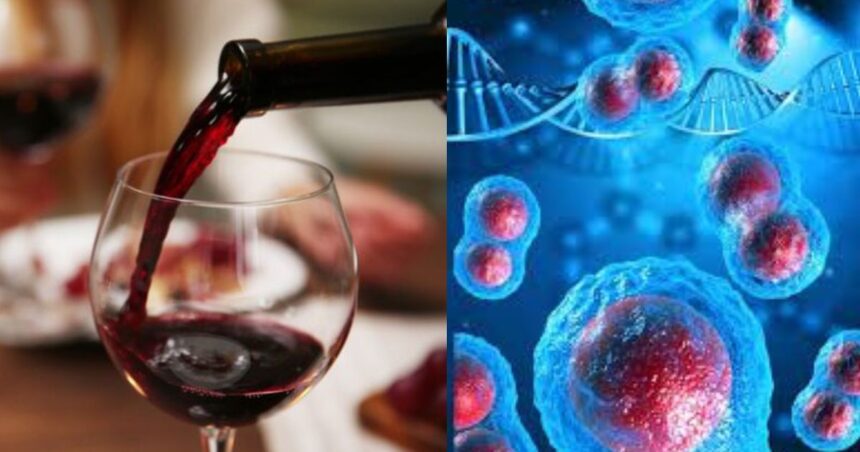The debate around how consuming alcohol might affect your health and increase cancer risk is a longstanding one. The discussions have been around whether certain types of alcoholic beverages are healthier than others. Red wine has managed to garner a good reputation since it has higher concentration of antioxidants, hence it’s said to be a better choice. Some research even suggests that red wine can have a positive effect on blood pressure and reduce heart diseases and cancer risk.
However, according to a new research, red wine might not deserve the appreciation. A meta-analysis of 42 observational studies spanning almost 96,000 participants found no evidence that consuming red wine lowers cancer risk more than white wine. But it is worth noting that all alcohol consumption raises cancer risk. The study was published on Jan 31 in Nutrients.
Did you know? Alcohol is a Group 1 carcinogen, like tobacco and asbestos, meaning it is proven to cause cancer in humans. Linked to cancers of the mouth, throat, liver, colon, and breast, its harmful effects stem from acetaldehyde, a toxic byproduct that damages DNA. Even… pic.twitter.com/KZP34Pq2x7
— Kristie Leong M.D. (@DrKristieLeong) January 12, 2025
The findings are very similar with the advisory from the Office of the Surgeon General released this year. The advisory warns Americans about alcohol and the risk of cancer, stated Dale Shepard, MD, PhD, hematologist and medical oncologist at the Cleveland Clinic.
“Something like 100,000 cancer cases can be linked to alcohol consumption,” Shepard told Health. “Any time we can remind the public about ways [that modifying] their lifestyle choices can limit cancer risk is important. You can also refer to Study probes awareness of alcohol’s link to cancer released by National Cancer Institute.
Red Wine, White Wine, and Cancer Risk
Even though there has been ample research showing connection between alcohol and cancer in general “there have been few large-scale studies directly comparing red wine to white wine in terms of cancer risk,” study co-lead author Eunyoung Cho, ScD, associate professor of dermatology and epidemiology at the Brown University Warren Alpert Medical School and School of Public Health, stated.
This is the exact reason that prompted Cho and her colleagues to critically analyse the available research. In the end, “our findings revealed no significant difference in cancer risk between red and white wine overall,” Cho explained.
However, there are two specific areas where white wine did have a greater link with cancer. The researchers also found that consumption of white wine was linked to a 22% increase in overall risk of developing skin cancer. Also, among women consumption of white wine led to a 26% increase in overall cancer risk.

Till now it’s not clear why this could be the case, Cho explained. “One possibility is that heavy alcohol consumption might be linked to high-risk behaviors such as sunburn, indoor tanning, or insufficient sunscreen use,” says Cho.
“But it’s still unclear why white wine appears to be the key factor,” Cho said. “Our study suggests that more research is needed to better understand the potential mechanisms behind this.” There is innumerable research out there which suggests a different analysis. Still, Cho stated that this is “one of the largest and first” studies of its kind to challenge “the belief that red wine is inherently healthier than white wine.”
Drinking a bottle of wine each week is the same as smoking five to 10 cigarettes a week when it comes to raising the risk of getting cancer, according to a new study. https://t.co/T6PUOaZUA8 pic.twitter.com/2wH4gyu1X1
— WebMD (@WebMD) January 2, 2020
Why Does Alcohol Raise Cancer Risk?
There are several mechanisms that researchers have proposed a potential connection between wine or alcohol consumption and the development of various cancers, Shepard said. What happens is, when a person consumes alcohol it metabolizes the liver, which then releases a toxic byproduct called acetaldehyde that can damage DNA, and sometimes turn into cancerous cells, he explains.
Alcohol can even cause oxidative stress in your cells, which can further damage your DNA. It even affects your hormonal function, and some research suggests that alcohol consumption can disbalance estrogen levels that can lead to higher breast cancer risk. These findings explain the gender differences observed in Cho’s study.
Shepard also added that alcohol is the 3rd leading cause of “preventable cancers behind tobacco use and obesity,” and these factors can play off each other. “Alcohol can actually increase the absorption of carcinogens from tobacco, for instance,” he said. “If you drink and smoke at the same time, carcinogens can be absorbed easier.”




